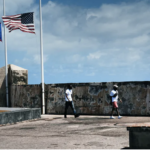By JONATHAN PAYE-LAYLEH and SARAH DiLORENZO
Associated Press
MONROVIA, Liberia (AP) _ The Ebola outbreak that has killed more than 1,100 people in West Africa could last another six months, the Doctors Without Borders charity group said Friday. One aid worker acknowledged that the true death toll is still unknown.
New figures released by the World Health Organization showed that Liberia has recorded more Ebola deaths _ 413 _ than any of the other affected countries.
Tarnue Karbbar, who works for the aid group Plan International in northern Liberia, said response teams simply aren’t able to document all the erupting Ebola cases. Many of the sick are still being hidden at home by their relatives, who are too fearful of going to an Ebola treatment center.
Others are being buried before the teams can get to remote areas, he said. In the last several days, about 75 cases have emerged in Voinjama, a single Liberian district.
“Our challenge now is to quarantine the area (in Voinjama) to successfully break the transmission,” he said.
There is no cure or licensed treatment for Ebola and patients often die gruesome deaths with external bleeding from their mouths, eyes or ears. The killer virus is transmitted through bodily fluids like blood, sweat, urine and diarrhea. A handful of people have received an experimental drug whose effectiveness is unknown.
Liberia’s assistant health minister, Tolbert Nyenswah, said three people in Liberia were receiving the ZMapp on Friday. Previously, only two Americans and a Spaniard had gotten it. The Americans are improving, but it is not known what role ZMapp played. The Spaniard died.
The American doctor infected with Ebola while working in Liberia said Friday he is “recovering in every way” and holding onto the hope of a reunion with his family.
Dr. Kent Brantly remained hospitalized Friday at Emory University Hospital in Atlanta. His comments came in a statement issued through the Christian aid group Samaritan’s Purse.
The World Health Organization has approved the use of such untested drugs but their supply is extremely limited.
The U.N. health agency has said the focus on containing the outbreak should be on practicing good hygiene and quickly identifying the sick and isolating them. That task is made harder, however, by the shortage of treatment facilities.
Beds in such centers are filling up faster than they can be provided, evidence that the outbreak in West Africa is far more severe than the numbers show, said Gregory Hartl, a spokesman for World Health Organization in Geneva.
There are 40 beds at one treatment center that Doctors Without Borders recently took over in one quarantined county in Liberia. But 137 people have flocked there, packing the hallways until they can be sorted into those who are infected and those are not, said Joanne Liu, the group’s international president.
Nyenswah described a similar situation in a treatment center in Liberia’s capital of Monrovia: In one ward meant to accommodate up to 25 people, 80 are now crowded in. Another treatment center with 120 beds is expected to open Saturday outside Monrovia.
“It’s absolutely dangerous,” said Liu, who recently returned from Guinea, Liberia and Sierra Leone. “With the massive influx of patients that we had over the last few days, we’re not able to keep zones of patients anymore. Everybody is mixed.”
Liu likened the situation to a state of war because the “frontline” was always moving and unpredictable. She said the outbreak could last six more months.
The death toll is now 1,145 people in four countries across West Africa, according to figures released Friday by the World Health Organization. At least 2,127 cases have been reported in Liberia, Sierra Leone, Guinea and Nigeria, WHO said.
Sierra Leone’s president, Ernest Bai Koroma, told journalists Friday that the country has lost two doctors and 32 nurses to Ebola.
“We need specialized clinicians and expertise and that is why we are appealing to the international community for an enhanced response to our fight” against Ebola, he said.
The Ebola crisis is also disrupting food supplies and transportation. Some 1 million people in isolated areas could need food assistance in the coming months, according to the U.N. World Food Program, which is preparing a regional emergency operation.
Amid a growing number of airline cancellations, the U.N. will start flights for humanitarian workers on Saturday to ensure that aid operations aren’t interrupted. In the coming weeks, they will also ferry staff to remote areas by helicopter.
___
DiLorenzo reported from Dakar, Senegal. Associated Press writers Clarence Roy-Macaulay and Krista Larson in Dakar, Senegal and contributed to this report.











